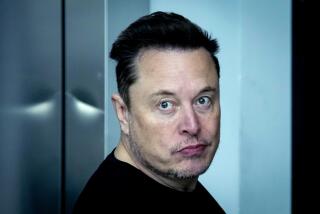IBM to Grant Less-Lucrative Options
- Share via
IBM Corp. said Tuesday that it would grant stock options to its top executives that are priced above market value in a move aimed at linking compensation more closely to the performance of the company’s shares.
The options will have no concrete value unless the stock rises at least 10% from its market price on the day they were issued, IBM said.
The Armonk, N.Y.-based company, which sells computer software, hardware and services, said the policy change was effective this year and applied to options granted to its top 300 executives.
The use of such “premium” stock options is seen as investor friendly but is relatively uncommon, said Mike Savage, an executive compensation consultant for AON Consulting.
“It’s saying that from a governance standpoint we expect the management to perform at a certain level before they can start reaping some of the rewards,” Savage said.
The move could decrease the cost of treating stock options as an expense, he said. The Financial Accounting Standards Board is widely expected to recommend in March that companies begin expensing stock options.
Randy MacDonald, IBM’s senior vice president for human resources, said that through premium pricing and a reduction in its overall equity compensation, it expects the value of stock options granted to decline 6% to 10% this year.
IBM has been criticized by some investors for its compensation policies, such as its large pay package for former Chief Executive Louis Gerstner. Shareholders have asked for a review of policies to examine the link between compensation and earnings.
IBM said that the move was designed to align executives’ interests with those of shareholders.
“These innovative programs continue to balance our shareholders’ interests with executive rewards, by requiring that IBM executives assume the same risks as our shareholders,” IBM CEO Samuel Palmisano said.
If the program is successful, the company may roll it out to all of its 5,000 executives in 2005 or later, MacDonald said.






